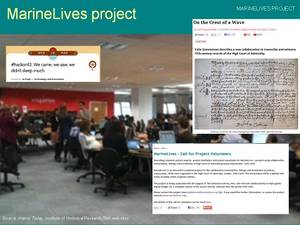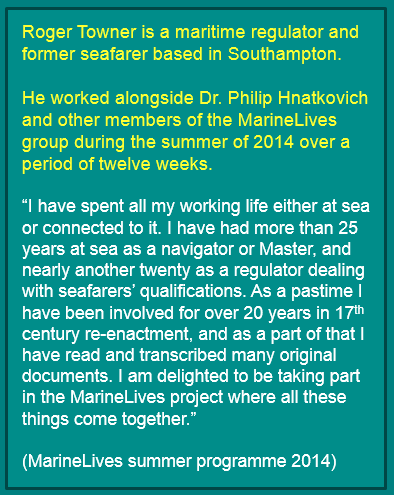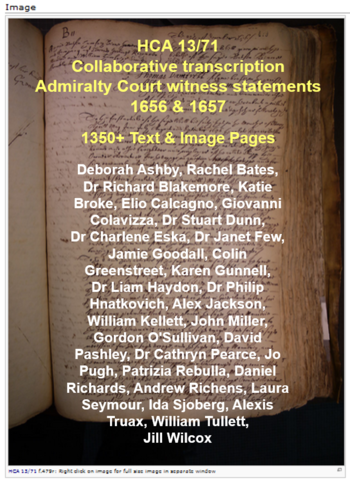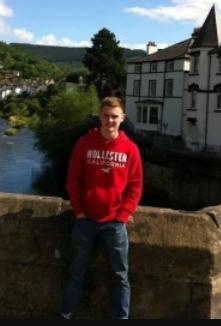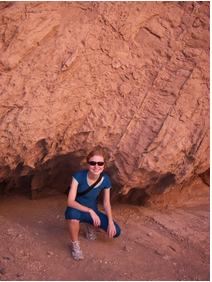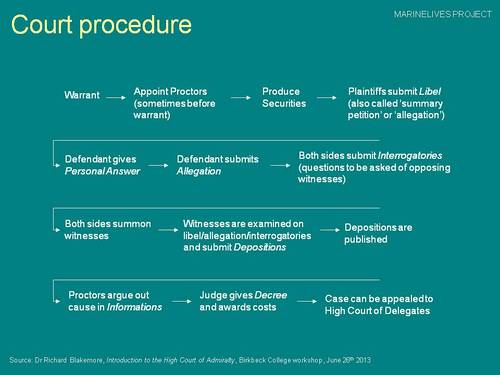MarineLives
Contents
Welcome to the MarineLives project
The MarineLives collaborative public history project was established in 2012 to digitise, transcribe and annotate the manuscript records of the English High Court of Admiralty from the 1650s and 1660s. The original records are held at the National Archives in Kew.
The project is led and advised by academics and members of the general public.
In the last three years project volunteers have transcribed over 3 million words and 6000 pages of Admiralty Court records.
Unpublished letters describing the London fire of 1666
As president of the English East India company in Surat between 1663 and 1669, Sir George Oxenden left a private correspondence with his sister, Elizabeth Dallison, and with other kin, close friends, and commercial partners. The correspondence, now in the British Library, provides a starting point from which to explore their lives.
A fascinating series of letters written between December 1666 and November 1667 described the impact of the fire of London in September 1666.
Bound in still bright red Indian leather, the volumes are the work of Oxenden’s copyists, his factory writers, rather than autograph manuscripts. The communication is largely one way, with Oxenden’s own voice often to be inferred from the tone and substance of his correspondents.[1]
See index to the private correspondence of Sir George Oxenden, 1663-1669
Summer transcription programme
We are running our popular ten week transcription training programme again this summer. Volunteers will work in teams of roughly four people, with each team supported by an experienced facilitator.
Volunteers who have already signed up for this summer's programme include a PhD candidate at the University of Tilburg in the Netherlands, a lecturer in Early Modern History at Birkbeck College London, an Oxford undergraduate historian, and a landscape historian who undertakes freelance historical research.
Past volunteers include a former mariner with over twenty-five years experience navigating the oceans, year twelve and GAP year students, archivists and a re-enactment enthusiast, and have been located in the United States, Italy and Belgium as well as the United Kingdom.
Volunteers will work from their homes or universities using our online resources, which include digital images of manuscripts and wiki based training material. Each team gets together weekly for a team Skype call or Google hangout to discuss progress, to ask questions, and to set goals for the following week.
In terms of the content we will be working on, we will tackle the completion of HCA 13/124 (personal answers by the principal defendants in Admiralty Court cases), and may also have a go at some of HCA 3/46 (an HCA Act Book) and HCA 13/73 (an HCA book of depositions for 1659 and 1660).
Please contact us to learn more about our summer programme.
Read more about Roger Towner's experience of our summer programme.
Our latest transcription challenge
HCA 13/124 is a volume of Personal Answers submitted in the English High Court of Admiralty in the years 1650 to 1652. The original manuscripts are held at the National Archives, Kew, England.
A complete set of digital images is available on this wiki, together with transcriptions of the first eighty six folios.
We are currently looking for volunteer transcribers to work with us to finish the transcription of this volume. Volunteers will be supported by an experienced trained facilitator. Novice and experienced transcribers are equally welcome.
Please contact us to learn more about working as a volunteer to complete HCA 13/124.
Introducing our content
HCA 13/71 is a volume of witness statements or depositions submitted in the English High Court of Admiralty in the years 1656 and 1657. The original manuscripts are held at the National Archives, Kew, England.
This volume was transcribed between September 2012 and March 2013 by a team of volunteer transcribers working on the MarineLives project. Full text semi-diplomatic transcriptions of the full volume are published on this wiki with associated digital images from the original manuscript volume.
Click here to access the text and images
Click here for an alphabetical list of deponents
Click here for a geographical list of deponents
Our team based transcription programmes
We run regular team-based transcription programmes on-line, facilitated by trained team leaders, with teams of three or four volunteer associates. These programmes last twelve weeks, and will take a transcriber from a novice to a confident transcriber in that space of time.
Please contact us to discuss volunteering, or to explore how we might work with your University, School or Local History Society.
Thomas Davies is a third year history undergraduate student currently studying at Bath Spa University. In the summer of 2014, Thomas was a member of a four person virtual team of volunteers transcribing Admiralty Court witness statements from 1658 to 1660, facilitated by Dr. Philip Hnatkovich in Pennsylvania:
"There were some challenging aspects of the programme — the main being distance. This was because we worked as a team and half of the team were based in the United Kingdom and half were based in the United States, so we had to be aware of time differences and that we would be unable to meet in person.
To combat this we used email, Google Hangouts, and Skype and made good use of all the resources available to stay in touch when working on the documents together. We had weekly calls to discuss team business. The weekly calls helped because we would talk about the problems or issues we faced weekly and how the transcriptions were to be presented covering topics such as layout or abbreviations.
The biggest challenge I faced in the transcription itself was becoming accustomed to the peculiar writing and distinguishing letters. Some letters look very similar, such as f’s and s’s, r’s and c’s not to mention t’s and l’s. I began transcribing effectively by taking it slow and working out the letters individually instead of looking at the word as a whole as we do with modern writing. I found this approach to be very effective.
MarineLives created a Bath Spa student section that helped me significantly, showing templates of letters and the different forms they have. This allowed me to tackle the many different writing styles the clerks used. Once I was able to distinguish between letters more clearly with considerable practise, I found I could transcribe enough of the page to get a good idea of what was being said in the documents. Then, I could alter words that did not fit within the context of the deposition, or using the context as a guideline as to what certain words should be."
Katherine Parker is a Ph.D. candidate at the University of Pittsburgh. She is currently writing her dissertation entitled “Toward a more ‘perfect knowledge': British geographic knowledge and South Seas exploration in the eighteenth century. She participated in the MarineLives Ph.D. forum in 2013, and the MarineLives summer programme in 2014:
"On summer research trips to London in 2011 and 2012, I had looked at a few HCA documents and knew that the cases recorded in them offered rich material for social, economic, and naval history. Over the course of several skype meetings, I and other PhD students got to give our opinions about the proposed platform and methodology for transcription. Working with a team created a strong community aspect to the project from the beginning; I have always been impressed by the inclusiveness and openness that drives MarineLives. Also, it was refreshing to have my opinion valued as a PhD student, as sometimes that stage in one’s education is isolating and transitional—you are not yet qualified as an expert, but also not unknowledgeable about certain fields.
The value MarineLives placed on the voices of the PhD forum made me want to participate further, even though the works being transcribed were not strictly within the chronological bounds of my dissertation project. Thus, when the summer transcription project was created, I jumped at the opportunity to use paleographic and transcription skills I had gained after a year in London archives on a Social Sciences Doctoral Dissertation Fellowship (2013-14).
Writing styles change over time, just like clothing and furniture styles. Thus, the letters inscribed within HCA volumes from the mid-seventeenth century posed a challenge for me, as I am used to the fluid, upright cursive (often written by a trained scribe or clerk) of the mid-eighteenth-century Admiralty. I came to enjoy the challenge of squinting at the digital pages in front of me, willing the words to make sense, filling in paragraphs slowly until suddenly they all made sense."
The Court records
Click here for full listing of Admiralty Court records within scope of MarineLives project
The English High Court of Admiralty produced a wide range of documents.
The various steps in a particular case can be followed in summary form in the Acts of Court.
A case was commenced with the issuing of a Warrant by the Court, and the preparation of a Libell or an Allegation by the party commencing the case.
Prior to witnesses being called to make their depositions, the defendant or "respondent" might make a Personal Answer in response to the Libell or Allegation.
The most accessible of the court records are the statements made by witnesses, which are called Depositions. These depositions were in response to written Interrogatories, which were prepared by both plaintiffs and defendants in a case.
Various written documents were submitted by plaintiffs and defendants, as well as witnesses, during a court case. Some of these have survived as loose documents in the Instance Papers.
Many cases were settled prior to the giving of a formal verdict or Sentence. For those cases which went to sentence, the sentences can be found in document bundles. These bundles often include bills of expense related to the case, and in some cases include copies of the allegations or libells, and other miscellaneous documents.- ↑ BL, Add. MSS. 40708-40713, The Oxenden papers, vols. XIII-XVIII
